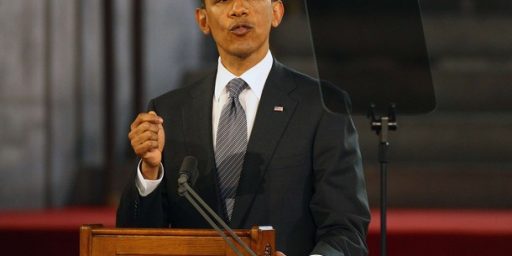Belief In ‘American Exceptionalism’ Is Declining, And That’s a Good Thing
A new poll shows that Americans don't buy into the idea of "American exceptionalism" as much as they used to. That's a positive development rather than a negative one.
A new study from the Pew Research people shows that Americans don’t necessarily believe in the idea of so-called ‘American Exceptionalism’ as much as they may have in the past:
As Americans prepare to celebrate the country’s birthday, a clear majority considers the U.S. to be one of the greatest countries in the world. But the view that the U.S. is exceptional – standing above all other countries in the world – has declined 10 points since 2011.
About three-in-ten (28%) think that the U.S. “stands above all other countries in the world,” while most (58%) say it is “one of the greatest countries in the world, along with some others.” Few Americans (12%) say there are other countries in the world “that are better than the U.S.”
Three years ago, 38% said the U.S. stood above all others, while 53% said it was one of the greatest nations and 8% thought some others were better than the U.S.
Interestingly, although perhaps not surprisingly for reasons I’ll discuss below, the drop seems to be most significant among self-identified Republicans:
The decline in the view that the U.S. is the greatest country in the world has occurred across most demographic and political groups, but it has been particularly acute among Republicans.
In 2011, 52% of Republicans said the U.S. stood above all other countries in the world, while 43% said it was one of the greatest countries in the world, along with some others.
Today, Republicans are 15 points less likely to say the U.S. stands above; 37% say it does, while 55% say the U.S. is one of the greatest countries, along with some others.
Democrats and independents continue to be less likely than Republicans to view the U.S. as exceptional, and fewer say this today than did so in 2011. Currently, about a quarter of Democrats and independents say the U.S. stands above all other countries in the world (down from about a third in 2011).
Still, most Democrats view the U.S. as among the greatest nations in the world: 62% say it shares this status with some others, while 25% say it stands above. Similarly, a 57% majority of independents say the U.S. is one of the greatest, along with others, and an additional 26% say it is exceptional.
While some might find the drop in support for the idea of “American exceptionalism” among Republicans surprising, it seems easily explainable. Clearly, what we are seeing here is a reflection of the overall disdain for President Obama and his policies that we’ve seen from the right since the beginning of his Presidency. This has been especially true with regard to foreign policy where they have made the somewhat bizarre claim that he has damaged the reputation of the United States during his six years in office, a an assertion that ignores both the damage that the Bush Administration did to that reputation and the facts themselves. On the domestic level, they have continually repeated the idea that President Obama is seeking to “fundamentally transform” the United States, and to turn the nation into something more resembling the social democracies of Europe. Leaving aside the question of whether or not these assertions and beliefs are true, and to a large degree they are not, this is what a large segment of the American right believes. Given that, it should not be at all surprising that we’d see a decline from that part of the political spectrum in support for the idea that America is “the greatest country in the world.” How can it be as long as that guy is in the White House?
Rod Dreher for one isn’t necessarily disappointed by the drop off in support among Republicans for the idea of American “exceptionalism, or for the idea itself”:
I think this is good news, actually, but not quite as good as it might be. The decline in Republican belief in American exceptionalism is probably tied to their political feelings about President Obama. My guess is that they understood the question to mean “does America currently stand above other nations,” rather than understanding it in a more philosophical sense.
I am against American exceptionalism, and not because I “hate” America, or am ashamed of my country, or anything like that. I’m against it because it is based on pride. If you asked me if life is better here than in most countries in the world, I would say yes, it probably is (though I’ve not been to most other countries in the world). But the concept of American exceptionalism has been too often used to convince ourselves that we, acting on the world stage, are not motivated by the same things that motivate other nations. We dress our hegemony up with the language of democracy and universal rights. I’m certainly not saying these are necessarily bad things, only that the ideology of American exceptionalism leads us to believe that we are obviously correct, and only driven by pure hearts. And that’s how we get into trouble.
Besides, it’s not clear to me why love of one’s own country requires elevating it morally above all others.
I largely agree with Dreher here. While I firmly believe that we live in a country that has contributed great good to the world, that our ideas of independence and liberty that were born in Philadelphia 238 years ago this week have inspired people around the world ever since, and that there is much to admire in American culture even while making fun of it most of the time. I’m also pretty sure that I wouldn’t want to live anywhere else, although the idea of trying out other parts of the world for an extended period of time is an appealing, albeit unrealistic idea. Like Dreher, though, I’ve always been somewhat uncomfortable with the idea of “American exceptionalism,” especially in the hyper-patriotic form that it manifests itself on the political right. More often than not, the assertion that the United States is superior in all respects to every other nation in the world is little more than a cover for the same old jingoistic nationalism that we have been dealing with for more than a century, and which has led us to engage in many dubious actions around the world with the self-assurance that we know what’s good for people in a given country better than they do. Moreover, as Dreher says, because we engage in these actions cloaked in the language of liberty, equality, and freedom, we come to believe not only are we correct, but that anyone who disagrees with us is evil because by opposing American policy, they oppose the ideals we claim to be advancing. Hence, we get ridiculous things like calling French Fries “Freedom Fries” because the French didn’t support George W. Bush’s war in Iraq.
This issue has come up before in the context of the refuted Republican argument that President Obama has gone around the world “apologizing for America.” Among the evidence that has been cited in support of this contention is something the President said in response to a question at a press conference very early in his Presidency:
Ed Luce, from the Financial Times. Where’s Ed — there he is.
Q Thank you, Mr. President. In the context of all the multilateral activity that’s been going on this week — the G20, here at NATO — and your evident enthusiasm for multilateral frameworks, to work through multilateral frameworks, could I ask you whether you subscribe, as many of your predecessors have, to the school of American exceptionalism that sees America as uniquely qualified to lead the world, or do you have a slightly different philosophy? And if so, would you be able to elaborate on it?
PRESIDENT OBAMA: I believe in American exceptionalism, just as I suspect that the Brits believe in British exceptionalism and the Greeks believe in Greek exceptionalism.
That’s where the people who have cited this remark stop and begin their commentary. The problem is they left out what he said next:
I’m enormously proud of my country and its role and history in the world. If you think about the site of this summit and what it means, I don’t think America should be embarrassed to see evidence of the sacrifices of our troops, the enormous amount of resources that were put into Europe postwar, and our leadership in crafting an Alliance that ultimately led to the unification of Europe. We should take great pride in that.
And if you think of our current situation, the United States remains the largest economy in the world. We have unmatched military capability. And I think that we have a core set of values that are enshrined in our Constitution, in our body of law, in our democratic practices, in our belief in free speech and equality, that, though imperfect, are exceptional.
Now, the fact that I am very proud of my country and I think that we’ve got a whole lot to offer the world does not lessen my interest in recognizing the value and wonderful qualities of other countries, or recognizing that we’re not always going to be right, or that other people may have good ideas, or that in order for us to work collectively, all parties have to compromise and that includes us.
And so I see no contradiction between believing that America has a continued extraordinary role in leading the world towards peace and prosperity and recognizing that that leadership is incumbent, depends on, our ability to create partnerships because we create partnerships because we can’t solve these problems alone.
To me at least, that seems like a very good, very reasonable statement of what real American patriotism ought to be, and what “American exceptionalism” ought to be about. The United States has done much good in the world, and I remain convinced that in the end we will continue to do so, but we have been far from perfect, we aren’t always right, and we’ve done several things throughout our history that have been outright wrong and immoral. Pointing those facts out shouldn’t lead to accusations that you don’t love your country, but that’s how it’s been for a very long time. More importantly, though, I don’t see what the point is of the kind of in-your-face nationalism that the conservative version of “American exceptionalism” actually is. There are plenty of other nations in the world that have done admirable things, and I’m sure the residents of those countries are just as proud of their heritage as we are of ours. If polls like this mean that Americans are dropping the rather silly moral pretense that we are better than everyone else, then that strikes me as a good thing.
Update: Further thoughts here.







“American Exceptionalism” is nice as a goal. We should hold ourselves to a higher standard than we hold others. The problem is when people think it’s an intrinsic state and therefore the rules of law or morality don’t apply to us.
While we can still be an example, although we are not really doing a good job of that now, we can no longer afford to be an exceptional hegemony. The members of The Project for the New American Century must be going nuts.
“Exceptionalism” has been turned into “those laws from which I may except myself once elected,”
Seat grand juries today.
To the extent Americans are getting past the notion that our country is innately superior in every way—or rejecting the “you’re either with us or you’re against us” jingoism of the recent past—it’s a good thing. But that has nothing to do with “American exceptionalism.”
I agree that those two notions and related ideas are what Americans are rejecting and the poll is measuring. The neocons, in particular, seemed to tie those ideas to the “exceptionalism” label. So much so, apparently, that President Obama, an intelligent and highly educated man, seems to think that’s what it means.
As originally conceived, though, “American exceptionalism” referred to the fact that the United States started from scratch during the Enlightenment and without much of the baggage of European history. While we hardly lived up to it from today’s perspective, we were founded on the notions of equality, liberty, self-government, and so forth. Theoretically, at least, we never had true social classes. And we held ourselves out as a “shining city on a hill” for others to emulate. Indeed, the idea was that we should seek to transform the world by sheer example rather than intervention into foreign affairs.
@James Joyner: Well said James!
well, we kinda had one enormous separation of people into two different classes in the beginning…
Calling yourself a “shining city on a hill” sounds like exactly the same narcissistic jingoism which younger voters are rejecting here.
American exceptionalism in the year 2014 is basically a generation that has not done all that much of note trying to enjoy some of the credit for things their parents and grandparents did.
It reminds me of grown men who are a little too involved in being sports fans. You may not have accomplished much or done anything great with your life, but perhaps some of Michael Jordan’s greatness will rub off on you.
We are the ones that let torture as a policy take place on our watch. We should be exceptionally ashamed of that one.
Often some of my history teachers would dwell on great empires of history and inevitably we would get into reasons for their fall, the most famous of which has always been the Roman Empire, for which their are many reasons for their decline. In most cases their is a certain amount of hubris.
“Manifest Destiny… Manifest Destiny”
@James Joyner:
There’s obviously a big difference between that conception of “American exceptionalism” and that one that has become prevalent on the right in recent decades. I don’t really have a problem with the way that’s expressed.
@anjin-san: Just curious, which generation are you referring to? Baby Boomers, Gen X, or something else? I ask because I think I know which one you’re talking about, but I don’t want to assume anything.
Even with all its faults, I still love my country. America is probably the only place on Earth that was not founded based on ethnicity or geography, but on an idea. It is one that we have struggled to live up to, and that many on the right don’t even really grok, but I still love what America stands (or, at least, stood) for, and what I think it will become.
Yet even so, I am also a huge fan of Japan, and there are also a lot of things I like about Canada, the UK, and Germany. You could say I luuuuuuuuuuuuuurve Japan. But I don’t feel any need to rank the USA above Japan or vice-versa. I point out problems in both, point out great things in both. They both share the #1 rank in my heart.
Now, let me get out of here before some conservative finds this comment and starts taking me to task for not being American enough…
@James Joyner:
That was what it meant, but language changes. As I have had to give up on the older, I am tempted to say real, definitions of irony, begging the question, and others, you may have to do so with American exceptionalism.
@ Jeremy
I am referring to my own generation, boomers. I will leave it to other generations to decide how well they have, or have not, lived up to the things that make America special.
A good summary of boomers I heard once was “we relived our parents lives with a frequent flyer upgrade.”
We did add the ideals of the hippie movement, some of which have real merit. What else have we done, except to live as comfortably as we could manage to?
@anjin-san: Yeah, I figured. And I could rant about your generation quite a bit.
As one person on Twitter said: “Baby boomers – the original entitled assholes.”
I’ve often been critical of my fellow Baby Boomers, but I would like to remind those from the generations that follow us: our generation paid a considerably higher price in blood in Vietnam than subsequent generations have in all subsequent wars. While not on the order of World War II’s sacrifices, 58,000 (probably 80-90% Baby Boomers) is considerably greater than 6-7,000. In addition, not all of us have wasted our inheritances. Some of us have actually built on them.
Partly it comes down to the definition of “America.” To liberals America is all its people – even the ones we don’t like. To modern “conservatives” America is people just like them, and only people just like them. (Scare quotes because the people calling themselves conservative are no such thing.)
When these conservatives see a black man in the White House, women on the Supreme Court, atheists on TV, gays walking around being, you know, gay, they’re frightened. They feel they’ve lost their America. And they have, they’re not wrong about that. The white-straight-male-Christian thing doesn’t buy what it used to. We are increasingly post-tribal.
Then too there’s the slow realization that our geographical isolation is an illusion. We used to be over here and they were over there. Not here. But in the last century we’ve had world wars 1 and 2, globalization, 9-11, the internet, all of which have ruined the illusion that we are somehow physically apart.
So in reality we are part of the world. Surprise! And we are not all white, straight and Christian. You see less of a change among Democrats in the poll because we “got it” a few decades before the other side did. Our America is improving, their America is fading.
@ Jeremy
As another commenter said recently, “yea, but our music is better”…
There have been some accomplishments that brought both pride and unified the people of this country. In July of 1969 the world stopped in its tracks to watch a man step down onto the surface of the in what has to be the greatest accomplishment in world history. After a decade of assassinations, rioting, and insurrections, cynicism, pessimism, negativism, the country was unified in pride and awe of American ingenuity and vision. We could learn from that and have a similar project and goal today, something to set our eyes and dreams on. Such a project could be, of course, a manned mission to Mars. We remember the huge excitement that took hold of this country with the space program. That is what is needed today. Every child got hooked on every rocket launch and embraced the astronauts as heroes. Interest in science soared! That all could happen again, but it will take the vision, determination, and unity of our leaders.
@Tyrell:
So we’re screwed, basically.
@James Joyner:
Well said. And I would say that we have transformed the world by sheer example. But what was the example? A nation dedicated to the proposition that all men are created equal. A nation where the individual is the most important entity. A nation based on natural rights which are not derived from government. A nation with a government of limited power which is constituted to protect the natural rights of the individual. This nation was exceptional. It was an earth shattering idea. There was no nation in the world like it. America was exceptional for what it was. It was not exceptional for anything it did.
@SC_Birdflyte: @SC_Birdflyte:
We hear you! Something to think about.
http://extendedremarks.blogspot.com/2006/12/vietnam-1965-day-it-became-longest-war.html
I was a sophomore in college in November 1965.
Something else to consider: http://www.youtube.com/watch?v=ugJ_59_adp8
@James Joyner: Thanks, James, for getting straight to the heart of the issue. The best summary of American exceptionalism was, I think, British Parliamentarian Edmund Burke: “America is the only country founded on an idea.”
As English philosopher Roger Scruton has pointed out, in European histor, a nation was founded on language, bloodlines and territory. Anthropologist Marvin Harris made the same points though in different contexts about near-Eastern and Asian kingdoms.
But only the United States was founded on the principles James mentions. In fact, only the USA was founded on principles at all. That these principles have not been fully achieved doesn’t negate the fact. Like the stars, we may never reach them but we still chart our course by them.
@michael reynolds: Rarely have you posted such absolute, stereotyped crap as this. A better example of one-dimensional, uncritical commentary cannot be found. Really, Michael you have here truly failed to reach even the very low standards you set for yourself when it comes to commenting.
Flame away, I don’t care.
@Donald Sensing:
Very well-reasoned comment. I must take some time to fully absorb your counterpoints.
@ Donald Sensing
Boy the way Glen Miller played
Songs that made the hit parade.
Guys like us we had it made,
Those were the days.
And you knew who you were then,
Girls were girls and men were men,
Mister we could use a man
Like Herbert Hoover again.
Didn’t need no welfare state,
Everybody pulled his weight.
Gee our old LaSalle ran great.
Those were the days.
Yes, America was founded on an exceptional set of ideas, and those ideas still resonate in the nation and around the world. If that is the origin of the phrase American Exceptionalism, then I do not think it is ever a good thing to see it fade away, or be denigrated because some have applied the phrase in an entirely different way. It would be better to focus on reeducating these deviants as to the truth of the phrase, if that is possible.
I tend to agree, @mannning:.
As it happens, I’m just now going over Charles Murray’s work on the subject, having cracked it at the beginning of last week.
@anjin-san: I think you may have missed a point of import.
Consider that they individually are not taking credit…. their belief is that the culture and its values are responsible for those achievements.
@Another Mike:
America is exceptional for what it is.
I cannot believe you used the past tense.